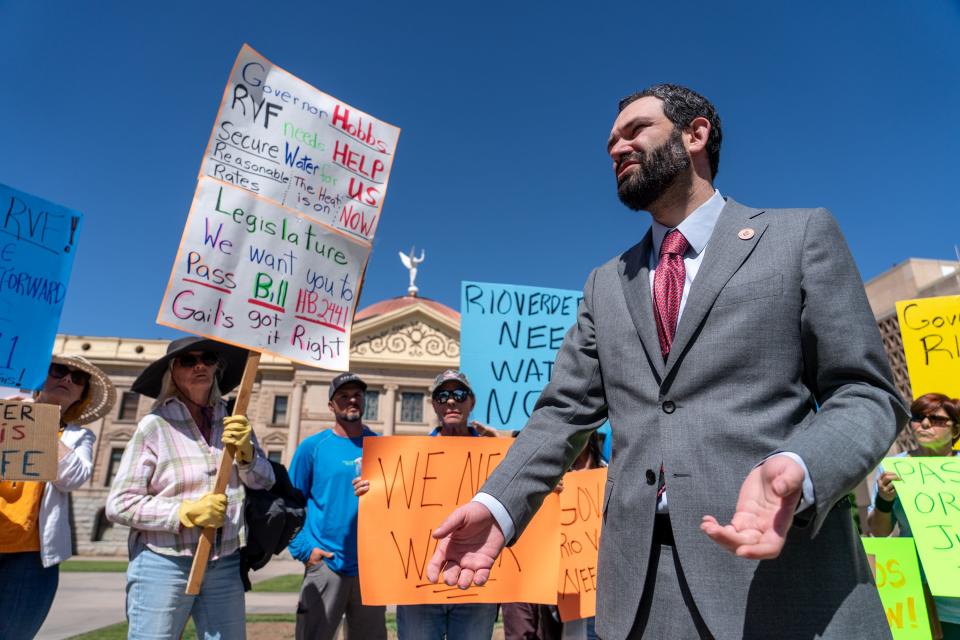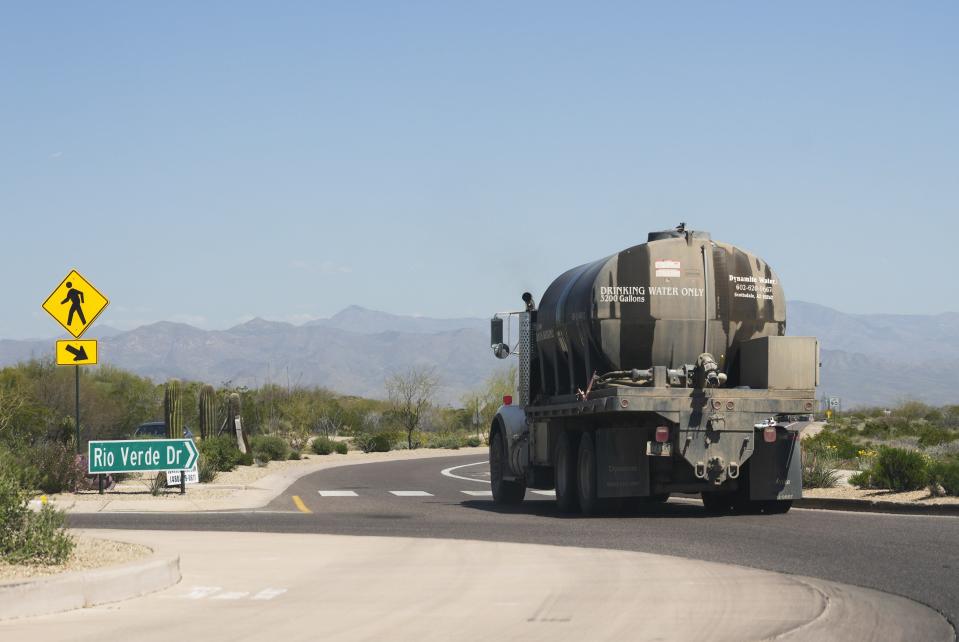Temporary solution to Rio Verde Foothills water issues heads to governor's desk
- Oops!Something went wrong.Please try again later.
- Oops!Something went wrong.Please try again later.
Rio Verde Foothills residents have a glimmer of hope out of a frenzied round of voting in the Legislature.
A bill aimed directly at solving the community's water woes, House Bill 2441, passed. It would obligate cities like Scottsdale, which cut off Rio Verde Foothills residents' water in January, to continue serving water to nearby communities and require municipalities to include the option of contracting with private water companies in their drought management plans.
"This bill isn't going to cost Scottsdale anything," said Rep. Gail Griffin, R-Hereford, who is the primary sponsor of the legislation. "It's going to get the spigots turned back on."
After a party line vote in the Senate and unanimous GOP support with a smattering of Democratic votes in the House, the bill still must be signed by Gov. Katie Hobbs to take effect. She can wield her veto stamp for five days, not counting Sunday, if she wishes to prevent the bill from becoming law.
The bill didn't pass with an emergency clause, meaning even if Hobbs approves it, the legislation takes effect only after a 90-day waiting period.
And Foothills residents remain embroiled in conflict over solutions. Last month, a protest intended to call for state-level action on residents' water problems fell apart after the demonstrators split on whether to support Griffin's bill or House Bill 2561, sponsored by Rep. Alexander Kolodin, R-Scottsdale.

One bill passed, one still stuck
Griffin's bill was the second-to-last to pass in the House before Arizona lawmakers began a weekslong break to work out high-stakes bills on transportation and housing.
That left Kolodin's bill in the dust. It passed the House last week but still needs a final vote in the Senate.
Kolodin's current version, specifically designed to garner bipartisan support, endeavors to create a new type of government entity called a standpipe district that could enter into agreements to help Rio Verde Foothills get water.
Unlike the water-taxing district previously proposed by some community members and shot down by the Maricopa County Board of Supervisors last year, the standpipe district's power would be limited to creating and executing a temporary agreement to get water to Rio Verde Foothills. Kolodin's legislation would only establish the district for a year and a half and includes provisions strengthening enforcement of lot-splitting laws on unincorporated county land.
A community without water: What to know about Rio Verde Foothills
That may reduce the number of homes illegally built by so-called "wildcat" developers without a reliable water supply, like some of the houses in Rio Verde Foothills.
Kolodin previously stressed to Foothills residents that his bill and Griffin's aren't in competition. Griffin is a co-sponsor on his legislation, and he voted for hers in the House Monday.
"Whether it's my bill, whether it's Rep. Griffin's bill, that matters less than getting these people water," Kolodin said.
But that hasn't stopped community members from picking sides. At last month's protest, resident Wendy Walker said she supports Griffin's bill.
"I love Rep. Kolodin and everything he has done to try to help us, but his bill has absolutely evolved and morphed into something that is not in the best interest of Rio Verde Foothills at all," she said.

What other solutions are in the works?
Both lawmakers' bills are designed to create immediate solutions for Rio Verde Foothills residents.
But the community is also in search of a long-term solution that will permanently provide a stable water supply. Currently, service to the community through private water utility Epcor is the main option on the table.
Epcor is regulated by the Arizona Corporation Commission, so that entity first must approve its application to serve the community.
Commission staff wrapped up a dayslong hearing on the issue last month, with Commission Administrative Law Judge Charles Hains ordering all parties in the case to submit closing briefs by May 26. Once those documents are in, Hains will issue a recommended order.
Commission staff then will add the case to an open meeting agenda, where it will be considered by the elected regulators. After that, they'll vote.
Commission staff said it's unclear exactly how long the process might take. Even if Epcor's application is approved, company officials said it could take the utility an additional 24 to 36 months to get water to Rio Verde Foothills.
Sasha Hupka covers Maricopa County, Pinal County and regional issues for The Arizona Republic. Do you live on unincorporated land and have a story to tell? Reach her at sasha.hupka@arizonarepublic.com. Follow her on Twitter: @SashaHupka.
This article originally appeared on Arizona Republic: Bill to address Rio Verde Foothills water issues heads to governor

